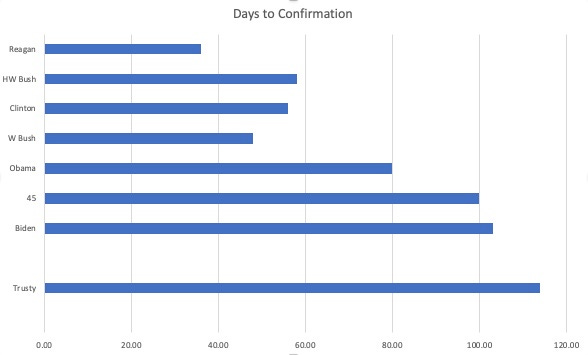The FCC has a quorum problem
Friday is the last day for both Commissioners Simington and Starks
Commissioner Nathan Simington announced Tuesday that he, too, will depart his post at the Federal Communications Commission on Friday. Commissioner Geoffrey Starks announced earlier this year that he was leaving late spring.
With both men out on Friday, only the chairman, Brendan Carr, a Republican, and Commissioner Anna Gomez, a Democrat, remain. Federal law requires at least three commissioners for a quorum. (It also provides for five members in all, two from the minority party and three from the majority.) REC Net published a quick analysis on agency actions that must wait for new appointees, including rule-making, actions on large fines, and new/novel issues.
According to some of the trade magazines (RadioWorld and Fierce Network), rumors about Simington’s possible departure circulated after two members of his staff resigned. He hired Gavin Wax as a new chief of staff, quelling rumors until agency watchers began wondering whether Wax was in line for the post.
On Monday, the U.S. Chamber of Commerce sent a letter in support of Olivia Trusty’s nomination. A nominee from the Republican party, Trusty was voted favorably out of the Senate Commerce Committee in late April. However, her nomination appears to have stalled. A handful of Senate Democrats have previously called on the White House to send a nominee to replace Starks.
Trusty’s wait for confirmation compared to the average wait for nominees in the first-year of a president’s term.
This FCC Actions Alert is produced by the volunteers at the Community Media Assistance Project under the direction of CMAP Executive Director, Betty McArdle. We monitor many sources of information about the Federal Communications Commission, federal communications law, and community developments important to your station and your community. The information provided in this newsletter is for general informational purposes only and should not be considered as financial or legal advice. Always consult with a qualified professional before making any decisions based on the content herein. If you have a news tip, please email us at betty@c-map.org.
Communications Act of 1934, Sect. 326.
Nothing in this Act shall be understood or construed to give the Commission the power of censorship over the radio communications or signals transmitted by any radio station, and no regulation or condition shall be promulgated or fixed by the Commission which shall interfere with the right of free speech by means of radio communication.


